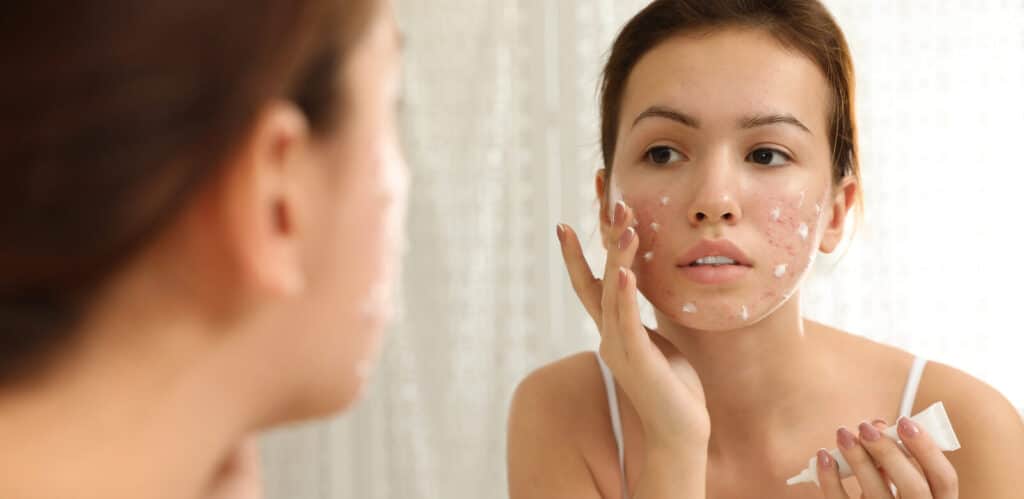What is Acne?
Acne is a skin condition that primarily affects the face, neck, back and chest and is characterized by clogged pores creating blackheads, whiteheads, and/or red papules (pimples). Underlying factors that contribute to acne breakouts are oil and bacteria along with changes in hormones.
Who is affected?
Nearly all of us have acne at some time or another. Acne affects both sexes and all races. Although acne mainly affects adolescents, it can affect a wide age range, including adults, children and infants.
What are some of the skin changes seen in Acne?
Acne signs vary depending on the severity of your condition:
- Whiteheads (closed plugged pores)
- Blackheads (open plugged pores)
- Small red, tender bumps (papules)
- Pimples (pustules), which are papules with pus at their tips
- Large, solid, painful lumps under the skin (nodules)
- Painful, pus-filled lumps under the skin (cystic lesions)
These skin changes are usually seen on the face, forehead, chest, upper back and shoulders.
What are the causes of Acne?
Four main factors cause acne:
- Excess oil (sebum) production
- Hair follicles clogged by oil and dead skin cells
- Bacteria
- Inflammation
Certain things may trigger or worsen acne:
- Hormonal changes. Androgens are hormones that increase in boys and girls during puberty and cause the sebaceous glands to enlarge and make more oil. Hormone changes during midlife, particularly in women, can lead to breakouts too.
- Certain medications. Examples include drugs containing steroids or hormones, like testosterone. Along with some OTC medications, like Biotin.
- Certain foods. Studies indicate that consuming certain foods — including carbohydrate-rich foods, and dairy — may worsen acne. Some people see improvement when eating a healthy and clean diet.
- Stress. Stress doesn’t cause acne, but if you have acne already, stress may make it worse.
What are some risk factors?
- Age. People of all ages can get acne, but it’s most common in teenagers.
- Hormonal changes. Such changes are common during puberty or pregnancy.
- Family history. Genetics plays a role in acne. If both of your parents had acne, you’re likely to develop it too.
- Greasy or oily substances. You may develop acne where your skin comes into contact with oil or oily lotions and creams.
- Friction or pressure on your skin. This can be caused by items such as telephones, cellphones, helmets, tight collars and backpacks.
What are the complications associated with Acne?
- Scars. Pitted skin (acne scars) and thick scars (keloids) can remain long-term after acne has healed.
- Skin changes. After acne has cleared, the affected skin may be darker (hyperpigmented) or lighter (hypopigmented).
- Psychological effects. Anxiety or depression can develop in teens and adults when dealing with feeling self-conscious about acne lesions on the skin.
How do you treat Acne?
Oral and topical antibiotics are widely used to treat with acute flares and inflammation. In hormonal based acne, medications like birth control pills and Spironolactone can be utilized. Non-medication options include radiofrequency microneedling, intense pulsed light, Celluma LED therapy, and regular facials. Proper skin care and oil control are instrumental in controlling symptoms.
How can Serene help improve your signs and symptoms of Acne?
At Serene we take a personalized approach to treating the skin. A thorough consultation is done by our Nurse Practitioner and a comprehensive treatment plan will be developed to address all concerns and work to improve your symptoms.

